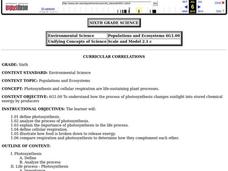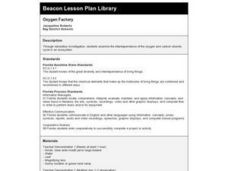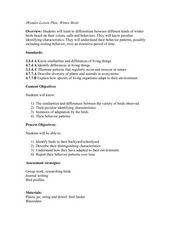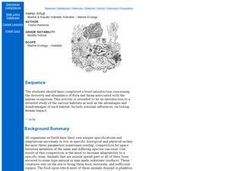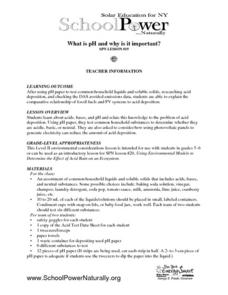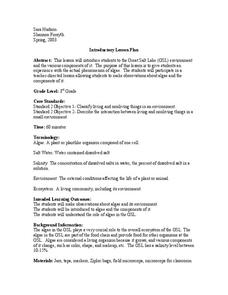Curated OER
Photosynthesis
Sixth graders are introduced to the process of photosynthesis by discussion and then by participating in an experiment. They then answer questions as independent practice project.
Curated OER
Oxygen Factory
Fourth graders examine the interdependence of the oxygen and carbon dioxide cycle in an ecosystem through a laboratory investigation. After a lecture/demo, 4th graders complete the lab in groups.
Curated OER
Science: Where the Worms Live
Students build mine-earthworm habitats to discover their niche in them. They make predictions about what the niche looks like in a week and draw a picture of it. Students notice the tunnels in the soil and how the sand and dirt are now...
Curated OER
How Hot is Too Hot?
Fifth graders use the scientific method to conduct experiments on the temperature effects on organisms. In this temperature effects on organisms lesson plan, 5th graders observe and record the hatching or the developing of organisms into...
Curated OER
iWonder Lesson Plan: Winter Birds
Students report on the colors, calls, behaviors, and physical characteristics of different winter birds. In this winter birds lesson plan, students also make a bird feeder.
Curated OER
Marine & Aquatic Habitats Activities - Marine Ecology
Middle schoolers enact the life cycle of a sessile animal and quantify the possibility of survival under the conditions given. They then present to the class a new adaptation which will increase the animals chance of survival.
Curated OER
Water Pollution
Fifth graders examine what contaminated water looks like, and how it becomes polluted. They examine a teacher demonstration of water is not polluted but does contain rocks and other things that do need to be cleaned out before drinking...
Curated OER
Transpiration
Students examine the part that transpiration plays in the hydrologic cycle. They observe how plants play a role in maintaining a stable environment.
Curated OER
Your Body: A Bacteria Incubator!
Young scholars demonstrate their comprehension of PREDICTING AND HYPOTHESIZING by... ¿¿¿ Predicting a logical outcome to a situation, using prior knowledge, experience and/or evidence. AND ¿¿¿ Explaining reasons for that...
California Academy of Science
Coral and Chemistry
Using cabbage juice as a pH indicator, future scientists explore the effect of increasing carbon dioxide on the pH of the ocean and relate it to the health of coral reefs. Ideal for an earth or environmental sciences course, this lesson...
Curated OER
What is pH and Why is It Important?
Students investigate about acids, bases, and pH and relate this information to the problem of acid deposition. They use pH paper, students test common household substances to determine whether they are acidic, basic, or neutral. Pupils...
Curated OER
Transpiration
Students explain the function of the hydrologic cycle and demonstrate how transpiration rates can be experimentally changed.
Curated OER
Great Salt Lake
Third graders are introduced to the Great Salt Lake (GSL) environment and the various components of it. They make observations about algae and its environment and discuss why it is considered a living organism and various components of...


